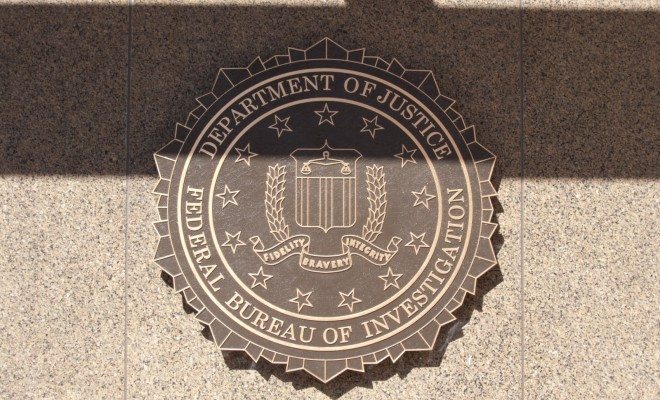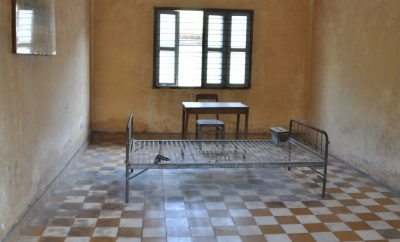 Image Courtesy of [Cliff via Flickr]
Image Courtesy of [Cliff via Flickr]
World
What Does the FBI Do Abroad?
Caught up in the whirlwind of the recent terrorist attacks in Paris was an interesting little footnote: American FBI agents headed to France to assist in the investigation. The FBI going to Paris or anywhere else outside the United States may, on its face, seem like the agency is overstepping its jurisdiction. When it comes to matters outside the borders of the country most assume that the Central Intelligence Agency would be the organization involved, not the FBI, whose mandate is more domestically focused. However, as this recent example and others have shown, the FBI does, in fact, operate abroad. Read on to see what the FBI does around the globe, how its role has changed over the years, and how all this activity is perceived internationally.
The Federal Bureau of Investigation Abroad
The beginning of the FBI’s work abroad can be traced back to World War II. In 1940, as the war intensified and the prospect of the United States joining in the fight grew, President Roosevelt assigned the Federal Bureau of Investigation to handle intelligence responsibilities for the Western Hemisphere. In an era before internationally-focused agencies like the CIA existed, the FBI was given the task. This initial step centered on finding and exposing Nazi spies who were attempting to sneak into the United States from South America.
The FBI realized early on that in order to maximize its effectiveness it needed to coordinate with local authorities in other countries. Starting in Bogata, Columbia, the FBI began assigning special agents to positions that would eventually be known as Legal Attachés or “Legats.” When WWII ended, the CIA took over much of the foreign intelligence work and the FBI shifted its international focus to training and developing working relationships abroad. Since then the program has continued to expand. According to the FBI’s Legal Attaché website:
Today, we have Legal Attaché offices—commonly known as Legats—and smaller sub-offices in 75 key cities around the globe, providing coverage for more than 200 countries, territories, and islands. Each office is established through mutual agreement with the host country and is situated in the U.S. embassy or consulate in that nation.
In addition to Legat offices in foreign countries, the FBI coordinates with similar organizations overseas like Europol. The following video looks at what the FBI does abroad with a focus, in this case, on investigation:
What the FBI Does
So what does the FBI do with all these agents and other personnel stationed abroad? A major focus of the FBI’s effort abroad is training. Among other things, the FBI’s training focuses on providing information on kidnapping, fingerprinting, and corruption. As part of this exchange, the FBI also welcomes a growing number of foreign nationals to its training facility in Quantico, Virginia.
In addition to training, the FBI assists with investigations in other countries. In the most recent example, the terrorist attacks in Paris, the FBI sent agents with particular expertise. According to the New York Times, the agents sent by the FBI have skills that focus on recovering data from electronic devices. The agents will help assist French police recover intelligence about the attackers and provide any information about U.S. security interests back to the United States. The FBI conducted a similar operation in Uganda in 2010. In that investigation, a large contingent of FBI agents were sent to the African nation to investigate the terrorist attacks and aid in identifying potential suspects.
In order to understand the FBI’s role abroad, it is important to look at how the bureau changed in the wake of the September 11 attacks in 2001. After the attacks, the FBI moved away from its traditional role of investigating domestic crime to a new focus on counterterrorism and intelligence gathering. This transition has been widely documented and is openly accepted by the bureau itself. According to an FBI report on its counterterrorism program after 9/11,
Since the horrific attacks of September 11, 2001, the men and women of the Federal Bureau of Investigation (FBI) have implemented a comprehensive plan that fundamentally transforms the organization to enhance our ability to predict and prevent terrorism. We overhauled our counterterrorism operations, expanded our intelligence capabilities, modernized our business practices and technology, and improved coordination with our partners.
A major driver behind the FBI’s international cooperation is enabling other countries to handle terrorism within their own borders so the FBI does not have to bring a suspect back to the United States to faces charges.
Abuse Abroad?
While the FBI’s methods are targeted to prevent terrorism and assist organizations abroad, the bureau has faced a lot of scrutiny for its actions in other countries. There are several examples of people, often American nationals abroad, alleging that improper techniques were used to extract information or force compliance.
One example is of an American national, Gulet Mohamed, who was detained in Kuwait on suspicion of being connected with known terrorist Anwar Al-Awalaki. Gulet, who had traveled in Yemen and Somalia, was detained and aggressively interrogated. He was then placed on the no-fly list. Amir Meshal, another American national, fleeing Somalia and headed to Kenya, shared a similar fate. Meshal was detained in Kenya and claims that he was tortured in order to force a confession. Another instance is the case of Raymond Azar. Azar, a Lebanese citizen, was captured, stripped, and taken from Lebanon then flown to the United States to be charged with bribery.
Yonas Fikre is yet another example. Fikre was arrested in the UAE at the behest of the FBI. He claims that he was detained after he refused to be an FBI informant. According to Fikre, he was then subsequently tortured and added to the FBI’s no-fly list. Fikre is one of nine members of his mosque who he claims have been added to the FBI’s no-fly list for refusing to become informants. In Uganda, four men from Kenya and Tanzania claim that they were illegally detained and abused by FBI agents. They claim that they were tortured in relation to a bombing in Kampala that killed 76 people, a crime which they were suspected of committing. A spokesperson for the FBI said that all agents act within FBI guidelines and the laws of the country where they operate.
These methods have not gone unchallenged. Both Fikre and Gulet challenged their place on the no-fly list and the methods employed by the FBI during their detentions. Meshal also took issue with his capture and actually attempted to file a lawsuit against the FBI. However, the U.S. Court of Appeals for the District of Columbia Circuit denied him the opportunity because his case dealt with national security. The suspects allegedly tortured in Uganda took issues with the conduct of the FBI as well. Their allegations of abuse led to an internal investigation by the FBI. Ultimately, though, following the investigation, no charges were filed. In all cases, the FBI has maintained that its agents acted appropriately.
The video below details the specifics of the case:
Conclusion
Unbeknownst to many citizens, the FBI has had a large and increasing presence abroad since the early days of World War II. This presence generally takes the form of agents, known as legal attachés, who are stationed at American embassies all over the world. The agents are primarily concerned with acquiring information and disseminating it to local law enforcement and counterterrorism agencies in the United States. This system helps empower countries to effectively combat terrorism and domestic threats as well as further U.S. security interests abroad.
Aside from information gathering and training, FBI Legal Attachés are often called on for assistance in investigating crimes and terror threats. There are numerous examples of this, from the recent attack in Paris to earlier attacks in Africa; the FBI also has its own list of selected accomplishments. In these cases, the FBI offered expertise in analyzing a crime scene or technical skills that the local government did not have.
Nevertheless, the FBI’s efforts abroad are not universally acclaimed. In the course of its investigations, the agency has repeatedly faced criticism for abuse and punishments for not cooperating, such as adding suspects names to the no-fly list without probable cause. Despite criticism, the FBI often maintains that its agents acted properly and internal investigations rarely find wrongdoing.
The FBI’s shift from focusing on domestic investigations to gathering counterterrorism intelligence has led many to criticize the agency. But the FBI maintains that it must change in order to be “a global organization for a global age.” The FBI has continued to grow its international presence in the form of Legal Attachés and several counterterrorism task forces after the 9/11 attacks. While some may criticize this trend, most evidence suggests that it will continue.
Resources
New York Times: F.B.I. Sending Agents to Assist in Paris Investigation
San Diego Union-Tribune: Al-Shabab Leader Threatens More Ugandan Attacks
New York Times: In 2008 Mumbai Attacks, Piles of Spy Data, but an Uncompleted Puzzle
New York Times: Detained American Says F.B.I. pressed him
CBS News: American Can’t Sue FBI Over Abuse Claims, Federal Appeals Court Says
Los Angeles Times: Lebanese Man is Target of the First Rendition Under Obama








Comments